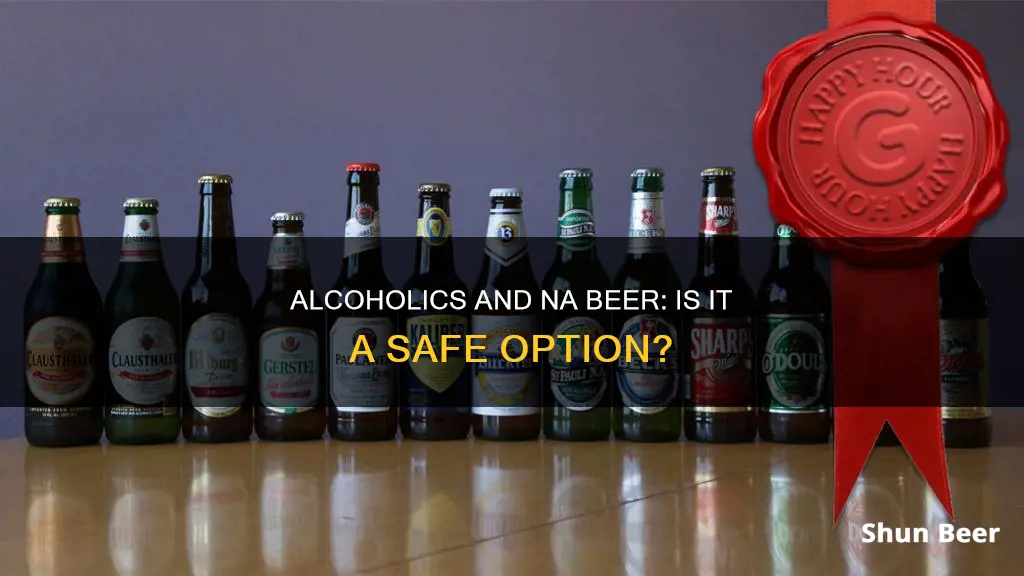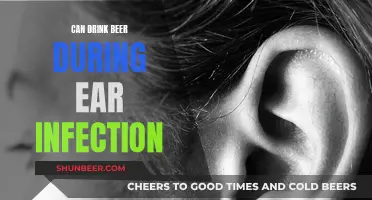
Non-alcoholic beer is a controversial topic in recovery communities. While some people feel that it provides a valuable alternative to people looking to moderate their alcohol intake, others say that there are many dangers in using non-alcoholic beer when quitting alcohol.
Non-alcoholic beer is often presented as a safe alternative to alcohol, but it is important to be aware of the risks before trying it. According to US law, non-alcoholic drinks can contain up to 0.5% alcohol by volume (ABV). This results in a product with 1/10th of the alcohol in regular beer. While this is a minuscule amount, a recent study found that 30% of non-alcoholic beverages had ethanol levels higher than declared on the label.
For many in recovery, the mere sensation or ritual associated with drinking can serve as a catalyst for a disastrous relapse. The smell and taste of non-alcoholic beer may be enough to trigger a relapse in some individuals. However, others argue that non-alcoholic beer can help them feel included at social events and minimise the risk of peer pressure.
Ultimately, the decision to drink non-alcoholic beer in recovery is a highly personal one. There is no right or wrong answer, and whether an individual feels they can safely consume it without jeopardising their progress is up to them.
| Characteristics | Values |
|---|---|
| Alcohol content | Non-alcoholic beer contains very little or no alcohol, with ABV levels ranging from 0% to 0.5%. |
| Taste and smell | Non-alcoholic beer often mimics the taste and smell of regular beer. |
| Health benefits | Non-alcoholic beer is generally made from natural ingredients and has fewer calories and less sugar than regular beer. |
| Safety concerns | Non-alcoholic beer may trigger cravings and relapse in recovering alcoholics. It can also lead to dangerous drinking behaviours, such as binge drinking. |
| Social benefits | Non-alcoholic beer can help recovering alcoholics feel included in social situations and reduce feelings of isolation. |
| Individual differences | The impact of non-alcoholic beer varies from person to person. Some individuals may be triggered by the taste and smell, while others may find it helpful in maintaining sobriety. |
What You'll Learn

NA beer may help alcoholics feel included in social situations
Social inclusion
In many cultures, alcohol is as much a social activity as a beverage. In early recovery, feelings of isolation are common, and the fear of being excluded or seen as different could contribute to a slip or relapse. NA beer can help people in recovery feel included at social events where alcohol is served. Sampling different nonalcoholic beers or the latest mocktails can create opportunities to connect with friends who drink, demonstrating that eliminating alcohol doesn't remove the fun or dampen the party atmosphere.
A path to sobriety
For some contemplating sobriety, the idea of never drinking alcohol again feels so depressingly impossible that they fall back into dangerous drinking patterns. Alcohol substitutes and low-alcohol beverages create a space for such people to begin restricting their drinking and addressing their addiction. NA beer gives them the ability to occasionally enjoy a drink while still keeping sobriety an attainable goal.
Health benefits
NA beer is far more organic and wholesome than full-alcohol lagers. They're generally made from only four natural ingredients – water, yeast, malt, and hops – with barely any preservatives or added sugars. Many people turn to alcohol to "take the edge off" after a long day, to help them relax and unwind in stressful situations, and even to aid insomnia. NA beer allows them to enjoy alcohol's soothing qualities without compromising their recovery.
Reduced risk of relapse
For many recovering alcoholics, the most challenging part of recovery is the feeling of isolation it brings when they are in many social situations. NA beer gives recovering alcoholics the ability to blend in and truly feel a part of things when in situations that inevitably involve drinking, without compromising their sobriety.
Beer Hour: Understanding the Social Drinking Culture
You may want to see also

NA beer may trigger a relapse for some alcoholics
Non-alcoholic (NA) beer is often marketed as a safe alternative for those looking to quit alcohol. However, it is important to be aware of the risks, especially for those in recovery from alcohol addiction. While NA beer typically contains very low amounts of alcohol, it is not entirely alcohol-free. The small amount of alcohol in NA beer is usually not enough to cause intoxication, but other factors, such as the smell and taste, can still trigger a relapse.
The Smell and Taste of NA Beer Can Be a Trigger
The smell of beer can activate the reward centres in the brain and trigger addiction, even if the beer is non-alcoholic. A study found that the smell of beer caused the release of dopamine in the brain for people with a strong association or attachment to alcohol. The taste and sensation of NA beer, which is designed to mimic regular beer, can also bring back memories of drinking and trigger a relapse. This is known as "euphoric recall", where people selectively remember the good times of drinking and forget the negative consequences.
NA Beer May Lead to Old Habits and Environments
Drinking NA beer can also lead to old habits and environments associated with alcohol use. Recovery experts agree that NA beer should not be part of a drug-free lifestyle. Substituting addictive behaviour with NA beer is not a sustainable solution, and the temptation to drink can increase the chance of relapse. Social situations that involve drinking alcohol can be challenging for those in recovery, and NA beer may seem like a good alternative to fit in. However, it is important to create new non-drinking habits and spend time with non-drinking friends to support recovery.
Individual Experiences Vary
It is important to note that the impact of NA beer on relapse varies from person to person. Some people may find NA beer helpful in moderating their alcohol intake, while others may view it as a dangerous loophole. The decision to drink NA beer during recovery should be based on individual triggers and motivations. Knowing your triggers and staying away from them is crucial. Ultimately, the benefits of NA beer should outweigh the risks, and a person should feel confident in their ability to maintain sobriety.
Beer Drinking and the Mystery of Missing Burps
You may want to see also

NA beer may be a good way to transition to sobriety
Social Benefits
For many recovering alcoholics, the most challenging part of recovery is the feeling of isolation it brings when they are in many social situations. Not being able to have a glass of wine with dinner, or enjoy a beer when hanging out at a ball game, makes them feel awkward, excluded, and different from their peers. NA beverages give recovering alcoholics the ability to blend in and truly feel a part of social situations that inevitably involve drinking, without compromising their sobriety.
A Path to Sobriety
For some contemplating sobriety, the idea of never being able to drink alcohol again feels so depressingly impossible that they throw in the towel before they start and fall back into dangerous drinking patterns. Alcohol substitutes and low-alcohol beverages create a space for such people to begin restricting their drinking and addressing their addiction – and sometimes, they find it attainable and rewarding, and ultimately choose total abstinence.
Health and Relaxation Benefits
Recovery aside, non-alcoholic beers are far more organic and wholesome than full-alcohol lagers. They're generally made from only four natural ingredients – water, yeast, malt, and hops – with barely any preservatives or added sugars. Additionally, many people turn to alcohol to "take the edge off" after a long day, to help them relax and unwind in stressful situations, and even to aid insomnia. Near-beer allows them to enjoy alcohol's soothing qualities without compromising their recovery.
A Valuable Alternative
Although some alcoholics merely drank to get as drunk as possible, others enjoyed the sensation and experience of drinking alcohol – and perhaps even considered themselves beer connoisseurs before their drinking grew out of hand. When contemplating facing their alcohol use disorder, they are often immediately discouraged by the thought of never being able to drink again. For such people, NA beverages and beer give them the ability to occasionally enjoy a cup while still keeping sobriety an attainable goal.
Reduced Risk of Relapse
The pressure of completely abstaining from alcohol can be daunting for some. NA beer provides a less intimidating middle ground that can help people reduce their alcohol consumption and lead a sober lifestyle.
Beer and Hyperthyroidism: What You Need to Know
You may want to see also

NA beer may be a slippery slope for some alcoholics
The Risks
NA beer can be a slippery slope for some alcoholics as it may trigger cravings and a subsequent relapse. The smell and taste of NA beer may be enough to trigger a relapse in some individuals. As addiction is strongly rooted in memory, the act of drinking NA beer, or even just holding the bottle and inhaling its scent, may ignite a relapse.
For some, NA beer provides an additional excuse and loophole to drink. It can be like playing with fire—one thing may lead to the next, and one innocent act can lead to a terrible relapse.
The Benefits
NA beer can be beneficial for those looking to moderate their alcohol intake. It can help people feel included at social events where alcohol is served, reducing feelings of isolation and the fear of being excluded or seen as different. It can also be a good alternative for those who enjoyed the sensation and experience of drinking alcohol, or considered themselves beer connoisseurs, before their drinking grew out of hand.
NA beer can also be a path to ultimate sobriety for some. It can create a space for people to begin restricting their drinking and addressing their addiction. It may be a valuable stepping stone to total abstinence.
Making a Decision
Ultimately, the decision to drink NA beer or not is a highly personal one. There is no right or wrong answer, and whether an individual feels they can safely consume it without jeopardising their progress is up to them. If an individual is only recently recovered or still battling cravings, NA beer may do more harm than good. However, if they have been sober for decades, they may feel more secure in their ability to stop themselves if things get out of hand.
Getting Older: Beer and Me
You may want to see also

NA beer may be a safe alternative for alcoholics
First, it is important to note that non-alcoholic beer is not completely alcohol-free. By law, non-alcoholic beers can contain up to 0.5% alcohol by volume (ABV). Additionally, research suggests that many non-alcoholic beers contain more alcohol than their labels indicate. This means that non-alcoholic beer may not be a safe option for people who are trying to avoid alcohol completely, such as pregnant people or those with liver impairments.
Another danger of non-alcoholic beer is that it may trigger cravings and relapse among people with alcohol use disorder. The smell, taste, and sensory experience of non-alcoholic beer can stimulate the reward centers of the brain and release dopamine, leading to increased cravings and the potential for relapse. For people in recovery from alcoholism, it is important to avoid triggers and maintain a lifestyle that supports sobriety.
However, non-alcoholic beer can also have some benefits for alcoholics. It can provide a valuable alternative for people who want to moderate their alcohol intake but are not ready to commit to total abstinence. It can also help people who are ""sober curious" or looking to reduce their alcohol intake for health reasons. Non-alcoholic beer is typically lower in calories than regular beer and can be a healthier alternative.
Overall, the decision to drink non-alcoholic beer during recovery from alcoholism is a personal one. Some people may find that it helps them moderate their alcohol intake, while others may find it triggering and a potential relapse risk. It is important for individuals to assess their own situation and determine whether the benefits of non-alcoholic beer outweigh the risks.
Whiskey and Beer: A Dangerous Cocktail?
You may want to see also







